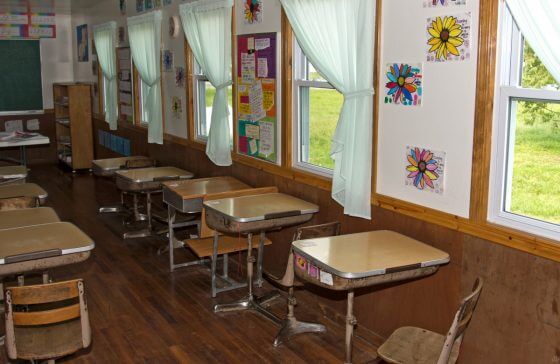Amish schooling issues
The Amish commitment to restricting schooling to eight grades is well-known. But what happens with those individuals who are driven to go further?
In Amish Society, John Hostetler examines the issue.
‘Before the Amish operated their own schools, more Amish youths were exposed to the possibilities of higher education and to teachers who inspired them to continue their education than is the case today. To become a committed Amish person, a boy or girl who likes school for its own sake must learn to be indifferent toward it.’
Hostetler goes on to look at the stories of three Amish-born individuals who had a profound struggle with their culture’s restriction on learning.
Rebecca’s story
One of them, ‘Rebecca’, ‘at the age of eighteen turned from her Amish background without having been baptized. “I read a great many books and anything I could get my hands on. I tried to persuade my father to let me go to high school. But he would not. After grade school I was Amish another six years and this was a very difficult time in my life. My dissatisfaction began to show in physical ways. I had no energy, I was anemic. Nothing interested me. I didn’t fit in with the Amish young people and I sort of despised them for their lack of learning. I made attempts to be popular among the Amish and dated a few times, but I didn’t like it very much. I was the oldest of eight, and mother kept on having children, and this tied me down and I was constantly resenting this. I was always running away to read, and I hid books. When mother was not watching I would read everything I could.’
‘When I was eighteen, I thought mother had reached the age when she could have no more children. Finally, I thought, I could begin to see daylight, have a little more time to myself, and to keep the house neat without working so hard. Then I learned that mother was pregnant again, and this was the last straw. I simply could not face this. I went to the basement and just cried. I told father I had had enough, I was leaving. While I packed my suitcase, mother became very upset. Father knew that mother needed my help. So we worked out a compromise. Father said if I would stay until the baby was born, the next year I could go to Bible school. This was enough for me; then I could get away and go where there was a library and read.’

Hostetler finishes the tale: ‘Rebecca went to college and left the Amish way of life. Later her brothers and sisters followed her example, and after several more years the whole family left the Old Order Amish faith and joined a Mennonite group. It is not uncommon for one or two children in a family to break with the tradition with the result that the parents do so later.’
Personally I’m of two minds on this issue. I lean much more strongly towards the idea that the Amish are doing the right thing with the eighth-grade limit. As a whole the society produces productive, content individuals. In many ways they are model citizens. And if getting to heaven really is the most important task we are engaged in on this planet, well, maybe cutting out some questionable influences is not such a bad idea.
On the other hand, for the ones that truly love learning, I imagine it must be an agonizing position to be in, or at least one that doesn’t lend itself to an easy resolution. To choose the Amish path and try to blunt your instincts, to leave or never join and cut yourself out of your cultural base, or to become Amish and hopefully try to figure out acceptable ways to quench your desire for education–it doesn’t seem an easy choice.
(Photos today of Lancaster Amish courtesy of Mylene. Thanks Mylene! I hope you all keep them coming, also if anyone has a link they would like me to include, feel free to mention that as well.)








“Personally I’m of two minds on this issue. I lean much more strongly towards the idea that the Amish are doing the right thing with the eighth-grade limit. As a whole the society produces productive, content individuals. In many ways they are model citizens. And if getting to heaven really is the most important task we are engaged in on this planet, well, maybe cutting out some questionable influences is not such a bad idea.”
Several years ago a self-help guru was making a killing off of the Amish folks in lancaster. The only reason they were willing to hand this huckster his huge fees, is because they’re unable to educate themselves through normal, more reputable means.
It seems to me that this story isn’t about education or reading at all. I think the key point is “I was the oldest of eight, and mother kept on having children, and this tied me down and I was constantly resenting this.” It sounds like the problem was not that she stopped going to school but that her parents expected her to do more to take care of the family than she was capable of at her young age. This is not an Amish thing or a rural thing; it happens in all different cultures and communities. In some communities it becomes so widespread over time that people stop being able to see that it is a form of abuse/neglect, with serious consequences, and think instead that it is their only option or a crucial part of their culture.
She clearly did not have time to pursue her own interests, which especially in the teenage years results in arrested emotional development. But from her description of the physical effects on her it is plain that her physical needs for rest were not being met, and it sounds like what she is describing is that she became depressed and tried to hide from these experiences both literally and in books.
It’s not that education isn’t a part of her story, or that having a choice to stop or continue education isn’t an important issue for this community to explore. But in this case I think that her love of education was just an easier way for the family and the author of this book to explain what was going on – not the whole story.
A part of what I’m trying to point out is that there’s a hunger for stimulation and knowledge. The books you sell and the conversations you have with the Amish (the ones that go on into the night) are sign of this. There is something elitist about how and who manages to achieve the opportunity to fulfill their intellectual needs. This is largely a recent phenomenon, (as in fifty years). So the social fall out is only starting to happen.
Tradeoffs of Amish education and schooling
A general naievete that potentially could be exploited by others is one result of living in a semi-closed culture and regulating education as the Amish do.
Is this a drawback though? Depends on your viewpoint.
The Amish would not be able to recognize half of the garbage that I have in my head from years of watching mainstream television as a child and adult. I feel that’s a good thing. What did the hours spent watching Ren and Stimpy cartoons ever do for me? At the same time the average Amish guy is not as streetwise as the average English.
It’s a tradeoff, and the Amish can be more open to exploitation by it, but when you use terms like ‘normal’ and ‘more reputable’ to describe schooling you are reflecting someone’s opinion–what exactly do those terms mean? And why again are these other types of schools you imply essentially better, as I infer is the opinion expressed here?
And after all, the Amish are able to educate themselves through the public system, if that’s what you mean–and many choose to (though maybe not so much in Lancaster).
And for that matter, a large number of Amish that I know are quite street-smart and can tell when there is a load of baloney in the room. I know eighth-grade level education Amish that run multi-million dollar businesses extremely effectively.
Do the hucksters out there only succeed in exploiting the Amish? It sounds like loads of people from the way you describe it. Was it really, or was it just a handful, and–whatever it was you’re referring to–did this get noticed primarily because there were Amish involved, as is the case in so many otherwise mundane stories that get play in the media?
Now I’m not Amish, and never have been, but I think a valid point that guys like Kraybill and Hostetler make is that the Amish system works pretty well in relation to what the Amish role as an adult is.
Many Amish finish eighth grade and are satisfied with that. The Amish, for the problems they do have, as a whole are a society that works pretty well. The point of the post is the dilemma faced by the ones that aren’t satisfied with eight grades.
Amish hunger for learning
Cady I agree with your points–this is the flipside of the eight-grades-and-out system–there are those that crave more…The thing is, most mainstream Amish do not frown on informal education, reading history and other non-religious subjects, etc.
Most kids understand that their role is to help, and I feel that when they take responsibility for a reasonable amount of work it can be very beneficial for the kid…sounds like this girl was overwhelmed and not allowed enough time for herself. That is another issue completely, and probably the more important one.
I don’t think her love of education was unusual…to make a generalization, the Amish are some of the most avidly curious people I’ve ever met, and quite a number of them, young and old, are voracious readers (just like anywhere else)…it just seems Rebecca’s desire was greater than what her familial situation would allow her to indulge. In the end, it sounds like she worked it out…I do think that certain Amish communities/families are more stifling than maybe they ought to be, and perhaps she would have remained Amish though, had she been allowed more time for her own intellectual pursuits.
I can understand a hunger for knowledge. It must have been a real struggle for her. It is weird but for me I hated school yet I love to learn things and want to keep learning all my life. I don’t know what I would do if I was told that’s it, you aren’t going to learn anymore.
My point isn’t about naievete, exploitation, or even Amish versus non-Amish education. I question your use of “productive and content” and “model citizens” in relation to their education. In regards to the attention these “so called” seminars got, they created so much havoc in the Amish community that the Bishops made it a shunnable offense to attend them.
You do the Amish a disservice by portraying this issue as being black and white, when the Amish position on education (just like the rest of society) is rife with ambiguities and unintended consequences.
“And after all, the Amish are able to educate themselves through the public system, if that’s what you mean–and many choose to (though maybe not so much in Lancaster).”
I think this is more than a little disingenuous, considering that Amish parents went to jail because they didn’t want to send their kids to public schools. I understand Holmes Co. Ohio has a different arrangement in that the Amish schools are more closely linked to the rest of the educational system, but that doesn’t justify portraying it as being a choice. Because it certainly isn’t.